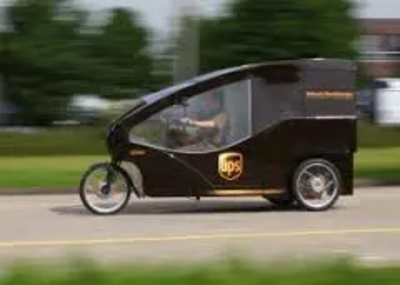Electric Motoring : UPS - a Global Delivery Company with a Global Sense of Responsibility

Most of us by have by now noticed the dark chocolate brown corporate livery of UPS - the US-based logistics and distribution company with a global reach. A bit of research, however, reveals that they are making useful contributions, not only to their own balance sheet, but also to the drive to control the increase in atmosphere carbon dioxide due to human activity.
With an interesting blend of self-interest, social responsibility and innovation that quite belies the rather old-fashioned style of their vans, they are using a rigorous analysis of the their business activities to identify those factors which can make the biggest differences to their balance sheet and to the future world of which they are determined to remain a part. Transit minutes saved, transit miles avoided and idle time reduced are all obvious cost saving measures - but less obvious is the care they are taking to match their vehicles to routes and types of environment in which they operate to minimise the fuel use - as well as matching the fuel itself to working patterns.
They have developed a software system which builds upon their own internal data infrastructure through the addition of prescriptive analytic tools, mathematical-routing algorithms, and customized map data. In 2014 20 million fewer miles were driven, eliminating 2.2 million gallons of fuel and 21,000 metric tonnes of CO2.
In addition the use of telematics to track and monitor vehicles, their positions and the way they are driven, which has been deployed throughout their small package, freight forwarding, and ground freight fleets, has avoided 281 million minutes of idling time in 2014, saving another 2 million gallons of fuel and 19,000 metric tonnes of CO2.
Finally, by matching fuel and vehicle type in novel ways the company hopes to save further fuel and pollution. They are slowly moving away from petrol and diesel towards gas power, hybrid vehicles, electric vehicles and electrically assisted tricycles.
In London they already have more than 30 electric vans and aim to take that up to 78 to service Central London over the next two years and have already got 80 operating in Amsterdam, Rotterdam and Hamburg. Where air quality is crucial and streets are narrow the company is extending an experiment started in 2013 using their Cargo Cruiser electrically assisted tricycles. These have the advantage of being able to be used in pedestrianised areas and streets and they plan to introduce these in a number of other urban centres from the end onf this year.
